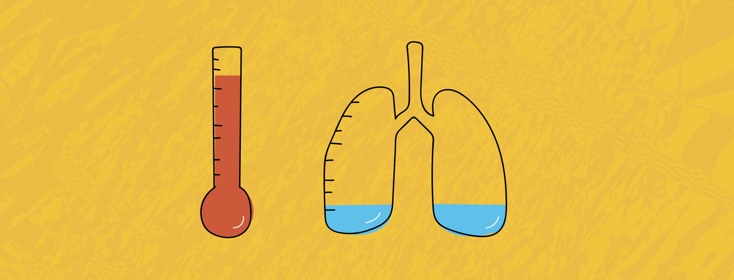Preparing for Hotter Weather With COPD
So, the weather is getting hotter. In many places, it’s going to get really hot. For many with COPD, this hot air may trigger flare-ups. Why is this? How can you beat the heat? Here’s what to know.
What are studies showing?
Studies are showing that hotter temperatures alone may trigger COPD flare-ups.1-5
- A 2014 John Hopkins University study showed that COPD symptoms got worse during outdoor heat waves. This was true whether COPDers spent their time indoors or outdoors.
- The same study showed that COPDers exposed to high indoor temperatures experienced worse COPD symptoms, increased medicine usage, and lowered lung function. COPDers exposed to high outdoor temperatures experienced worse COPD symptoms, but did not use more medicine or lose lung function.
- A 2009 study showed that COPD symptoms got worse when the temperature exceeded 84.2 degrees Fahrenheit. It showed that heat was responsible for increased hospital admissions for both COPD and asthma.
- A 2013 study came up with similar results. Another study showed that hotter weather caused an increase in emergency room visits among the COPD population.
Why does heat trigger flare-ups?
Researchers seem to be unaware of the reason why heat triggers flare-ups. However, there are some theories that attempt to explain why.
Thermoregulation
Intense heat causes stress on your body. Normal body temperature is 98.7 degrees Fahrenheit. So, when exposed to heat, your body has to work to cool down to maintain this 98.7 degrees. This takes energy. It increases your body’s oxygen demand. People with COPD may have trouble keeping up, causing you to feel short of breath.6,7,9
Nerve stimulation
Heat may have an impact on nerves inside your lungs. It may activate special nerves that cause bronchospasm. This theory has been tested on asthmatics and not so much on the COPD population. So, it’s something that may be studied more in the future.6,8,9
Humidity
Higher temperatures allow air molecules to hold more water. Air that holds more water can be heavy and hard to inhale. So, this may be one reason hot and humid air may trigger COPD.
Allergens
Allergens like dust mites and molds love hot, humid temperatures. So, they tend to grow in higher numbers when the air is hot and humid. This can happen in your own home without you even being aware of it. These allergens can become airborne and easily inhaled. They may trigger flare-ups.
Outdoor air pollution
Higher outdoor temperatures may have an impact on outdoor air pollution. Some studies have shown links between ozone and respiratory symptoms. Ozone levels may be increased during the warm summer months. Particulate matter is another type of pollution that may be increased in warmer weather. These are microscopic particles too small to be seen but that is easily inhaled.5,6,9
Indoor air pollution
Higher indoor temperatures may have an impact on indoor air pollution. This may include particulate matter and gases like nitrogen dioxide.6,9
Anticholinergics
These include muscarinics like ipatropium bromide (Atrovent) and tiotropium bromide (Spiriva). Ipatropium Bromide is also one of the ingredients in Duoneb and Combivent. Muscarinics are known to "impair sweating and blunt the normal cardiovascular response to heat."Muscarinics are also top-line COPD medicines, and are commonly prescribed to help you breathe easier.7
What are some tips for beating the heat?
The best option for beating the heat is air conditioning. Central air or window air conditioners are equally effective. Along with cooling air, they also dehumidify and filter it.6,9
If you don’t have air conditioning, an option is to plan events during the hottest parts of the day at cooling centers. These are public places that offer air conditioning and cool air. They are places where you can cool off, such as your local library or recreation center.9,11
Another tip involves staying well hydrated. The standard recommendation is at least 8 cups of water every day. Make sure you take water with you if you have to leave your home.7,12
So, these are tips recommended by the experts. How do you beat the heat?

Join the conversation